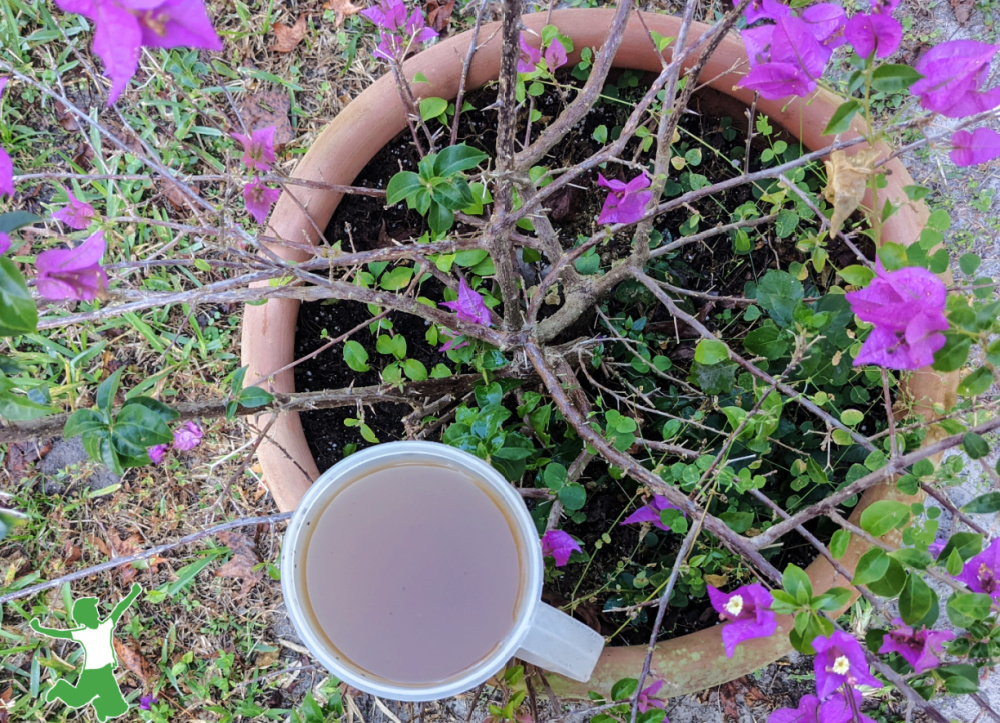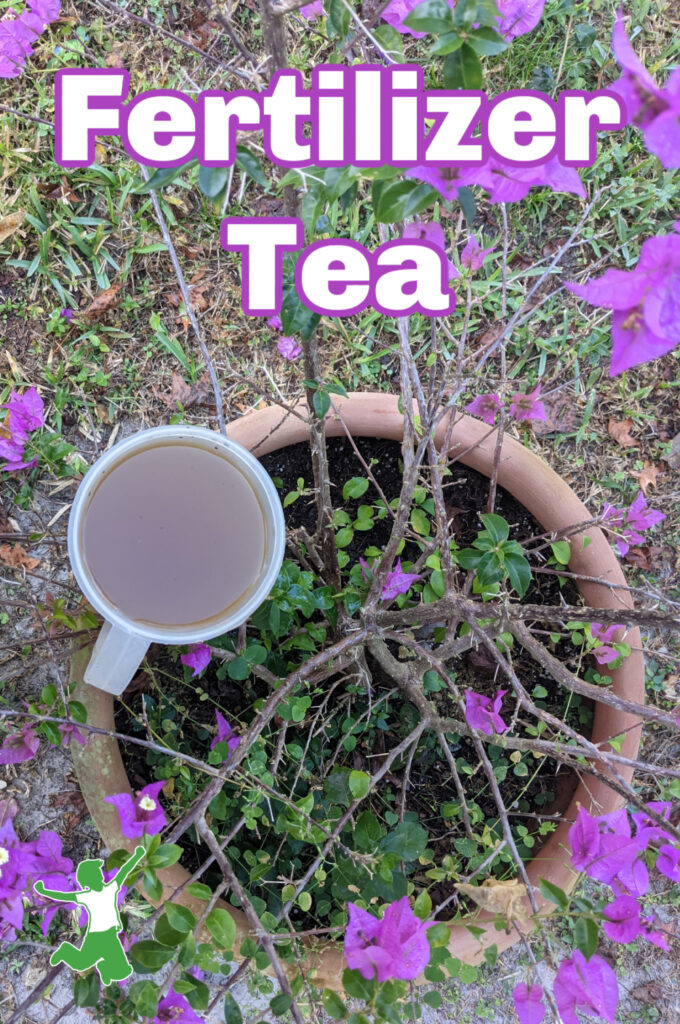Three easy and inexpensive ways to make fertilizer tea for nourishing garden vegetables, indoor plants and flowers via application to foliage or soil.

Whether your gardening involves vegetables, fruit trees or flowers, fertilizer tea can be a beneficial tool used in conjunction with natural fertilizers to improve productivity.
And, with the skyrocketing price of fertilizers, it’s handy to know how to make gardening tea yourself with next to no expenditure needed!
What is Fertilizer Tea?
Fertilizer tea is a nutritious liquid made from granular fertilizer, compost or lawn clippings.
It is applied to plant foliage or directly to the soil to provide a quick burst of nutrients and to speed growth.
How to Use
Because fertilizer tea is diluted with water, it is a mild solution that won’t burn plant leaves or roots.
Thus, it can be applied more frequently without the risk of overdoing it.
I like to apply every 2-3 weeks.
Once a plant blooms, it is best to only apply fertilizer tea to the soil.
Three Ways to Make at Home
There are three primary ways to make fertilizer tea. Two of them are absolutely free!
So if the skyrocketing prices of organic and commercial fertilizers have you concerned, choose one of the free methods below to keep your gardening efforts as inexpensive as possible.
Grass Clippings
The easiest method for making fertilizer tea is to use freshly cut grass clippings after mowing the yard.
This method also costs you nothing.
Grass is naturally high in nitrogen and potassium, two very essential nutrients for growing and established plants.
To transfer these nutrients from the clippings into a fertilizer tea, follow these instructions.
- Gather up some of the fresh, green clippings next time you mow the lawn.
- Fill a 5-gallon bucket two-thirds of the way with these cuttings.
- Top up the bucket to just below the rim with rainwater or filtered water. Do not use tap water which contains chlorine and other toxins.
- Place the bucket in a spot that is warm and dry but doesn’t get direct afternoon sun.
- Let the clippings ferment for 3 days uncovered. Stir at least once a day.
- Strain out the clippings and affix the lid to the 5-gallon bucket to keep critters out. I suggest doing this by pouring the tea into a second 5-gallon bucket with a strainer over the top.
- Add the wet clippings to your compost pile or discard.
- Decant some of the fertilizer tea as needed in a spray bottle or commercial sprayer for widespread application every two weeks or whenever your plants could use a boost.
Note that if you treat your lawn with pesticides or weed and feed, it is best NOT to use the clippings to make fertilizer tea, especially if you will be using it in your vegetable garden.
Compost Tea
Fertilizer tea made from compost is aptly called “compost tea”.
It’s also easy and free if you make your own compost with kitchen scraps.
You can also buy a bag of organic compost inexpensively from a local nursery if you don’t have your own pile.
*Do not use compost made with manure to make compost tea.
The method for making compost tea is very similar to fertilizer tea. Simply follow these steps:
- Take one shovel of finished compost and place in a 5-gallon bucket.
- Top up with rainwater (best) or filtered water to just below the rim.
- Place the uncovered bucket in a warm, dry spot that does not get direct afternoon sun.
- Stir every day for 3-7 days.
- Strain out the compost (I do this with another 5- gallon bucket and a strainer) and affix the lid.
- Throw wet compost back into the compost pile.
- Apply undiluted compost tea to plant foliage or as a soil drench every two weeks or as needed.
Organic Granular Fertilizer
In cases where you do not have a compost pile and don’t have yard clippings readily available, you can make fertilizer tea from granular fertilizer.
*I recommend only using this method with natural organic fertilizers (I use this brand).
To make tea with granular fertilizer, follow these steps.
- Add 1 cup of organic granular fertilizer to 1 gallon of rainwater or filtered water in a large bucket.
- Stir and let the mixture set for 24 hours uncovered outside in a shady, dry spot that does not get direct afternoon sun.
- Strain out the fertilizer and use the solids to mulch around the root zone of garden plants and flowers.
- Apply undiluted liquid at a rate of 1-2 cups per plant or 2-4 cups for large plants as a soil drench or spritzed on leaves as foliage feed.
Fertilizer Tea vs Compost Tea
If you have both compost and fresh, unsprayed yard clippings available, which is best to make…fertilizer tea or compost tea?
In that case, it is best to choose compost tea because the nutrients in the final liquid will be more extensive than from grass clippings alone.
Shelf Life
Homemade fertilizer tea will last for months if you store it in a dry place.
I would suggest making a fresh batch if it is more than a year old.
Be sure to always store it with a tight-fitting lid, as the mixture will continue to ferment and get smellier as time goes on!









Do not use compost with manure in it? All of the best compost will have some added manure! What’s up?
Use manure if you want, but the fertilizer tea will smell horrendous and certainly is not be something I would use as a foliage spray on indoor plants, flowers or vegetables in the garden that I frequently pluck and eat without washing!